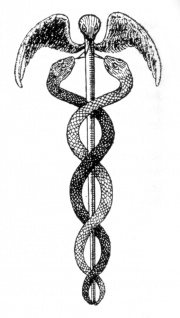Caduceus

The Caduceus (from Greek κηρύκειον kērúkeion "herald's wand, or staff") is the staff carried by Hermes in Greek mythology and Hermes Trismegistus in Greco-Egyptian mythology. The same staff was also borne by heralds in general, for example by Iris, the messenger of Hera. It is a short staff entwined by two serpents, sometimes surmounted by wings. In Roman iconography, it was often depicted being carried in the left hand of Mercury, the messenger of the gods and guide of the dead.
H. P. Blavatsky wrote:
That the Serpents were ever the emblems of wisdom and prudence is again shown by the caduceus of Mercury, one with Thot, the god of wisdom, with Hermes, and so on. The two serpents, entwined around the rod, are phallic symbols of Jupiter and other gods who transformed themselves into snakes for purposes of seducing goddesses—but only in the unclean fancies of profane symbologists. The serpent has ever been the symbol of the adept, and of his powers of immortality and divine knowledge. Mercury in his psychopompic character, conducting and guiding with the caduceus the souls of the dead to Hades and even raising the dead to life with it, is simply a very transparent allegory. It shows the dual power of the Secret Wisdom: the black and the white magic. It shows this personified Wisdom guiding the Soul after death, and its power to call to life that which is dead—a very deep metaphor if one thinks over its meaning.[1]
Online resources
- Caduceus at Theosophy World.
Notes
- ↑ Helena Petrovna Blavatsky, The Secret Doctrine vol. II, (Wheaton, IL: Theosophical Publishing House, 1993), 364.